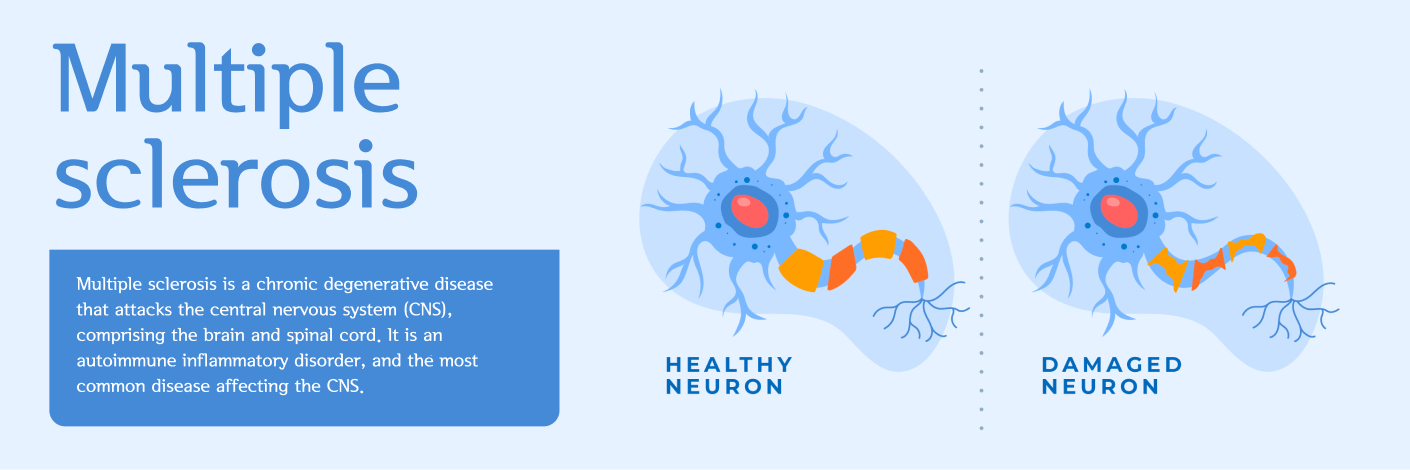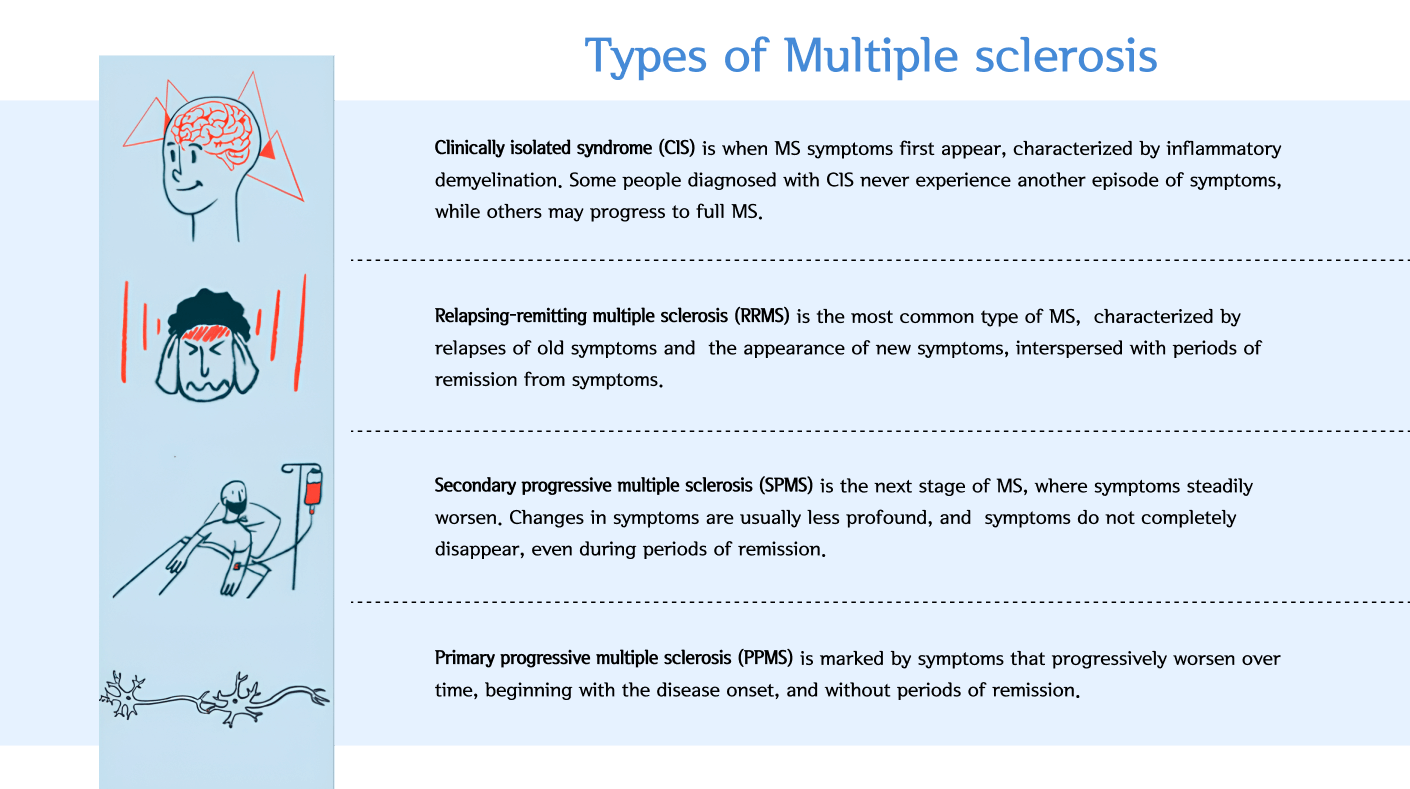
Multiple sclerosis (MS) is an autoimmune disorder whose prevalence is on the rise world-wide, affecting nearly one million people in the United States alone. This debilitating condition affects mostly females (75%) and is more common among people of northern European ancestry. The disease strikes relatively early in life, with symptoms most often appearing between the ages of 20 and 50. Despite years of extensive research, little is known about the specific causes of MS.
Learn about multiple sclerosis, its symptoms and health effects, and how NAD therapy can help patients to manage and control its progression.
What is Multiple Sclerosis?
Multiple sclerosis is a chronic degenerative disease that attacks the central nervous system (CNS), comprising the brain and spinal cord. It is an autoimmune inflammatory disorder, and the most common disease affecting the CNS. The condition causes your immune system to attack the myelin sheath that provides a protective insulating covering for your nerve fibers, allowing for electrical impulses to travel quickly and efficiently along the nerve’s path.
In multiple sclerosis, the myelin sheath is damaged when immune cells pass through the damaged blood–brain barrier (BBB) and release cytokines that attack the nerves’ protective myelin covering, causing lesions – a process called demyelination. When myelin is damaged, it can cause nerve impulses to slow down, stop, or misfire, impacting multiple systems throughout your body.

Demyelination can be triggered by multiple factors:
- Viral infections
- Vaccinations
- Vitamin B12 deficiency
- Insufficient oxygen supply to affected tissues
- COVID-19

Vitamin B12 is critical to the formation and support of the myelin sheath, yet B12 deficiency is common. Vitamin B12 is found mostly in animal sources like grass-fed beef and liver, eggs, lamb, wild-caught fish, and dairy products. Vegans and people who avoid red meat are at high risk of B12 deficiency, which can lead to demyelination and permanent nerve damage.
Research suggests that hypoxia (low oxygen levels) may play a role in MS. People with MS often have lower oxygen levels in their brains compared to healthy people, possibly due to reduced blood flow caused by inflammation. Low oxygen in the brain can activate immune cells, triggering a pro-inflammatory response that causes more damage to the myelin sheath of nerves. Poorly oxygenated regions of the CNS are more likely to develop myelin lesions.
During viral infections, your immune system goes into overdrive to fight off invading pathogens. In patients with MS, the autoimmune response can be triggered and exacerbated in response to a virus or a vaccine, intensifying its attack on the CNS. In one study, CNS demyelination was identified as a complication after receiving a COVID-19 vaccination.
Another study of MS patients who were infected with the coronavirus reported intensified symptoms, with a significant number of patients developing new symptoms, experiencing worsening of existing symptoms, or both. New symptoms included sensory, motor, visual, and balance problems.
MS Prevalence and Symptoms
A 2023 report released by the National Multiple Sclerosis Society analyzed data to get an idea of multiple sclerosis prevalence in the United States, and to create a profile of MS patients.. Of 744,781 adults identified with MS, 76% were female, with a median age of 45 to 54 years. Seventy-seven percent of the subjects affected by MS were white, 10 percent were black, and 7 percent were of hispanic ancestry.
Multiple sclerosis is a degenerative disorder, meaning it gradually becomes worse over time. Early symptoms of MS begin to appear when sufficient demyelination has occurred in a particular area of the brain or body.
Early symptoms of MS include:
- Chronic fatigue
- Difficulty walking or loss of balance
- Numbness and tingling in the extremities
- Muscle pain, stiffness or spasms
- Vision problems
- Slowed cognition
- Motion sickness, nausea and vomiting

Progression of Multiple Sclerosis
Multiple sclerosis is a progressive disorder with four identified phases:
- Clinically isolated syndrome (CIS) is when MS symptoms first appear, characterized by inflammatory demyelination. Some people diagnosed with CIS never experience another episode of symptoms, while others may progress to full MS.
- Relapsing-remitting multiple sclerosis (RRMS) is the most common type of MS, characterized by relapses of old symptoms and the appearance of new symptoms, interspersed with periods of remission from symptoms.
- Secondary progressive multiple sclerosis (SPMS) is the next stage of MS, where symptoms steadily worsen. Changes in symptoms are usually less profound, and symptoms do not completely disappear, even during periods of remission.
- Primary progressive multiple sclerosis (PPMS) is marked by symptoms that progressively worsen over time, beginning with the disease onset, and without periods of remission.

The severity and type of symptoms can vary from one patient to the next, depending on which area of the CNS has been affected by demyelination. While remyelination has been observed in animal studies, there is currently no known cure for multiple sclerosis.
Role of NAD in MS Management
Nicotinamide adenine dinucleotide (NAD) is a powerful coenzyme found in every cell of the body. NAD plays multiple roles in human health, including energy production, DNA repair and synthesis, mitochondrial support, and much more. In the case of multiple sclerosis, NAD acts as a protective agent within the central nervous system against inflammation and cell damage.
NAD therapy helps to manage and alleviate MS symptoms in multiple ways:
- Helps to maintain cellular health and protects against oxidative stress
- Modulates the inflammatory response via activation of SIRT1, a protein that regulates immune cell function and reduces pro-inflammatory cytokines
- Supports mitochondrial health to promote cell survival and protect neurons from demyelination
- May alleviate disease progression and symptoms
- May impact the differentiation and function of immune cells, to mitigate the autoimmune response
NAD is considered a nutrient, not a drug, so you don’t need a medical prescription for NAD therapy. There are no known negative side effects from NAD treatment. Infusion via IV is recommended over oral supplements, to prevent the loss of potency during digestion. In addition to relieving MS symptoms, NAD has a broad range of health benefits, including anti-aging and metabolic benefits.
Get NAD IV Therapy for MS in NYC
Multiple sclerosis shows up at a time in your life when you are most productive at home and at work. Symptoms often appear while you are raising a young family, growing your career, and being active in your community. As symptoms progress, MS can dramatically impact your quality of life.
NAD IV therapy can help you to manage your MS symptoms while improving your overall health. Located in the heart of Manhattan, Invita Wellness provides a convenient and comfortable environment for regular NAD IV therapy for MS, without going to a hospital or medical facility. To access the benefits of NAD, contact Invita Wellness today, and take charge of your health so you can live your best life.
To access the benefits of NAD
contact InVita Wellness today
Book Now
456 Broadway 2 Floor, New York, NY 10013, USA
Resources
Garjani, Afagh, et al. “COVID-19 is associated with new symptoms of multiple sclerosis that are prevented by disease modifying therapies.” Multiple sclerosis and related disorders 52 (2021): 102939.
https://pmc.ncbi.nlm.nih.gov/articles/PMC9585399/
Hamed, Yasser, et al. “CNS Demyelination Syndromes Following COVID-19 Vaccination: A Case Series.” Journal of Pharmacy and Bioallied Sciences 16.Suppl 1 (2024): S1005-S1009.
PMC11000968
Penberthy, W. Todd, and Ikuo Tsunoda. “The importance of NAD in multiple sclerosis.” Current pharmaceutical design 15.1 (2009): 64-99.
https://www.ingentaconnect.com/content/ben/cpd/2009/00000015/00000001/art00009
Wang, Xin, et al. “Nicotinamide adenine dinucleotide treatment alleviates the symptoms of experimental autoimmune encephalomyelitis by activating autophagy and inhibiting the NLRP3 inflammasome.” International immunopharmacology 90 (2021): 107092.
https://www.sciencedirect.com/science/article/abs/pii/S1567576920327648
Zhao, Xinda, and Claire Jacob. “Mechanisms of demyelination and remyelination strategies for multiple sclerosis.” International Journal of Molecular Sciences 24.7 (2023): 6373.
https://pmc.ncbi.nlm.nih.gov/articles/PMC10093908/